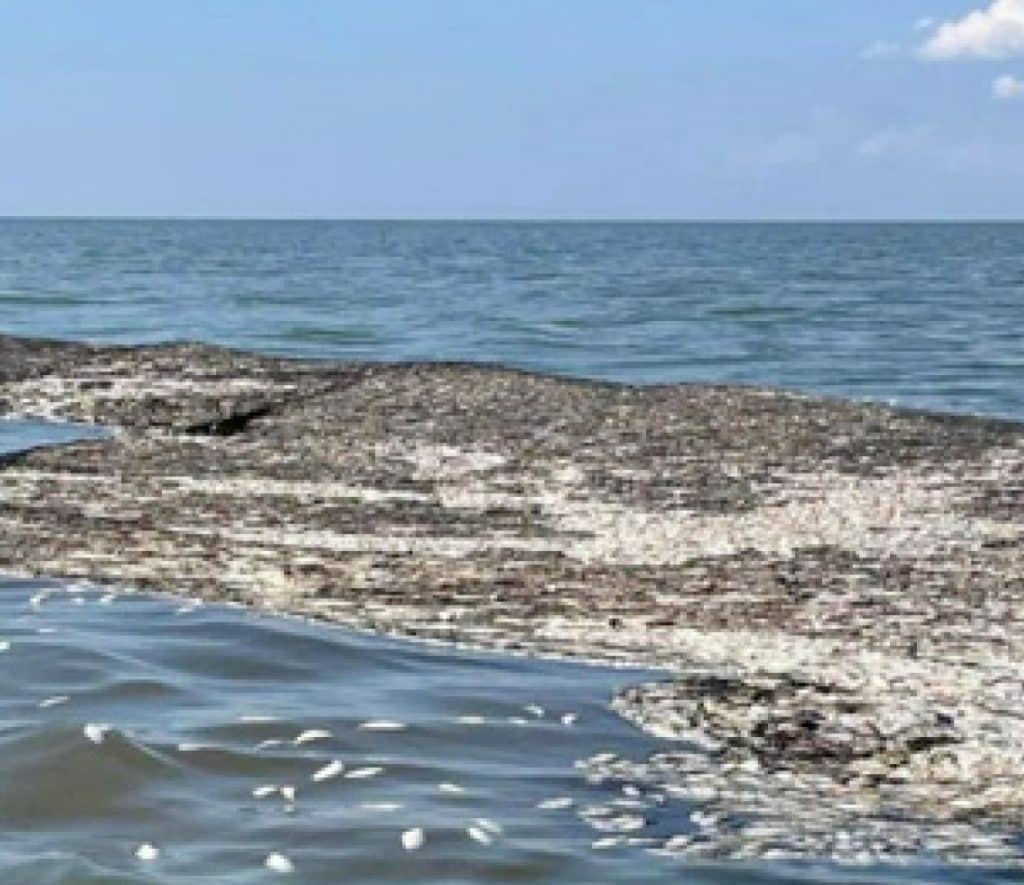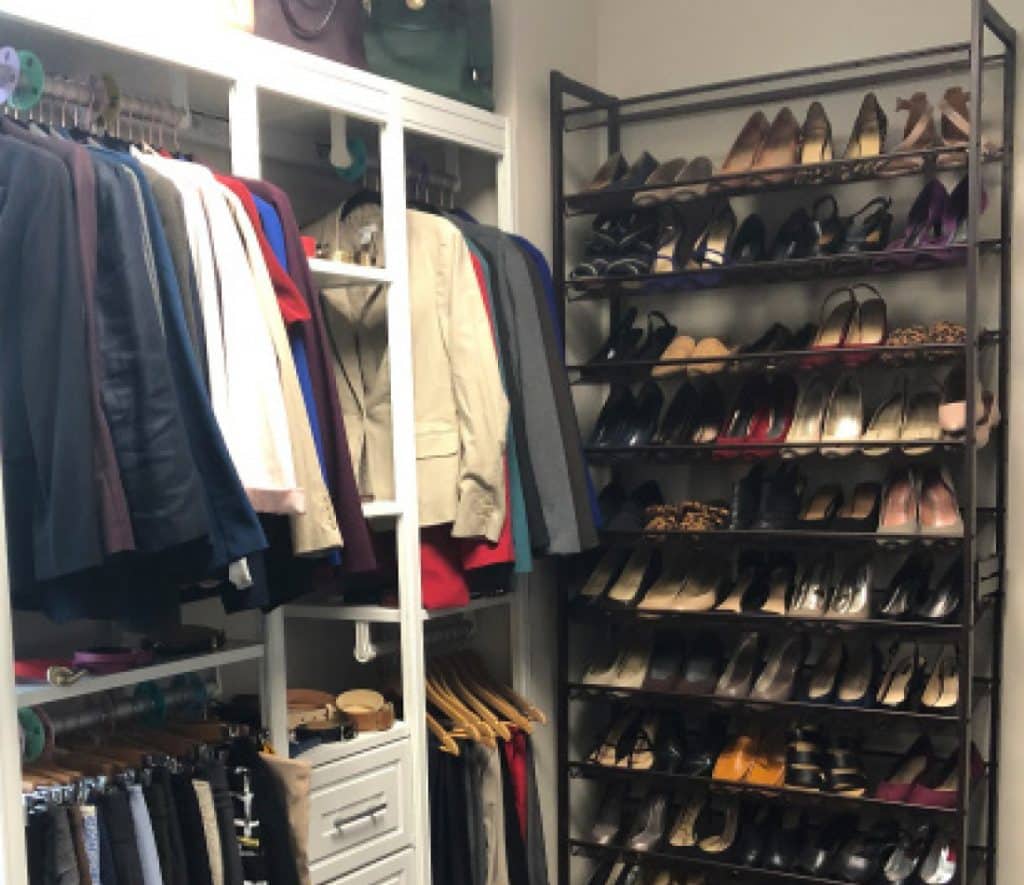A number of residents of the Lake Area and Cameron Parish marveled at recent photos released by the Coastal Conservation Association that showed an enormous untethered net that was packed full of fish and floating abandoned off the Cameron Coast. The photos were taken off Holly Beach.
The CCA estimated that the net (with the fish in it, I presume) weighed 500,000 pounds.

Louisiana Sportsman identified the net as a menhaden net and stated that the net is mainly full of pogies. Omega Protein reported that their company owned the net. It became untethered when it was filled with a greater number of fish than the workers could handle. (Workers cut the net loose.)
Some locals said the water under the net was too shallow to accommodate the menhaden boat and that the boat would have run aground if it had tried to go there.
A number of Louisiana conservationists expressed anger about the incident. For instance, Chris Maculso, the Marine Fisheries director of the Theodore Roosevelt Conservation Partnership, said, “These are not insignificant incidents. Louisiana is the only state that does not have a catch limit or a meaningful restriction on where these boats can operate. These companies need to be held accountable for the damages they are doing to our fisheries … Two foreign-owned companies … are mining nearly one billion pounds of vital forage from our waters every year and damaging our shallow habitats.”
The Coastal Conservation Association executive director asked that people in the coastal areas continue to photograph or film “fish kills” and send the documentation to the Louisiana Dept. of Wildlife and Fisheries.
As of the time of this writing, I haven’t seen any updates about the incident on the site of Wildlife and Fisheries. But I will admit it’s not the easiest site to navigate.
Cameron Sheriff Ron Johnson said the fish kill would be dealt with in a matter of a very few days.
McNeese Opens Cowboy Closet
The Cowboy Closet at McNeese State University is now open. The Closet is meant to give students some financial relief by providing them with professional clothing for interviews, internships and other professional activities.

After meetings with the McNeese Career Center, the Burton College of Education and the SGA executive team, the SGA wound up providing funding to cover more than $8,000 in startup costs.
Students can make an appointment for a one-on-one consultation with a staff member in the “boutique-style” space. The Closet provides “gently used” suits, scrubs, McNeese polo shirts, shoes, slacks, button down shirts, blouses, dresses, belts, ties and coats for students. The Closet is open to all McNeese students; it is housed in the Burton Business Center, room 211B.
Burton said the enterprise will have clothing drives on an annual basis.
The Closet is now accepting monetary donations for display stands, cleaning supplies and cameras. Sponsorships are available for such items as a dressing room mirror, garment bags, tie racks, jewelry racks and a table covering.
There are several ways to make a tax deductible donation: mail a check payable to the McNeese Cowboy Closet to the McNeese Foundation, Box 91989, Lake Charles, LA 70609; go to mcneesefoundation.org and click on “Give Now”; or drop off a check to the Burton Business Center, room 439, on the McNeese campus.
“The Cowboy Closet is very important for McNeese students,” Stafford said. “Now they have access to free professional clothes which will expand their opportunities and confidence in their future endeavors in the workforce.”
COVID-19 Victims Can Get Funeral Assistance
Those who are struggling with funeral expenses for someone who died due to COVID-19 can apply for FEMA Funeral Assistance by calling 844-684-6333. Phone lines are open 8 am to 8 pm, Monday through Friday. Multilingual services are available. Applicants requiring relay services, such as a videophone, Innocaption or CapTel, should provide FEMA with a specific number assigned to that service.
FEMA should be able to easily contact all applicants for the assistance.
At present, there is no deadline to apply for the aid.
To qualify for the assistance, the person in question must have died of COVID-19. The death must have occurred in the USA. The funeral, burial or cremation costs must have been paid after Jan. 20, 2020.
The person applying for the assistance must be a U.S. citizen, a U.S. national, a lawful permanent resident or a qualified refugee. (The deceased does not need to meet these qualifications.)
When applicants call for assistance, they need to provide the following information:
— Social Security number
— Date of birth
— Current mailing address and phone number
— The deceased person’s date of birth
— The location where the deceased person died
— Information about any funeral or burial insurance policies that were in place
— Information about other funeral assistance that was received, such as donations or CARES Act grants.
Answers to frequently asked questions about the application process can be found on FEMA’s Funeral Assistance FAQ page. Search for “COVID-19 Funeral Assistance” at FEMA.gov. You can follow the assistance program on Twitter at twitter.com/FEMARegion6 and on Facebook at facebook.com/FEMARegion6.
Are They Really Prying?
It may be that not every person in Lake Charles likes the local government. But as far as I know, no one here thinks the local government is crazy.
The same may not be the case in Lafayette, where local government has spent the last few years wrapped up in actions that seem more like publicity stunts than serious government activities. They’ve tried to outlaw panhandling and homelessness (both of which are protected by the First Amendment) and have successfully prevented a transvestite from reading a story to a children’s group at the public library (which sounds like the sort of thing that would eventually become a First Amendment issue).
The latest big new fun city government project in Lafayette is to charge reporters for each page of government documents they request under the Freedom of Information Act. (This is the part of the story where I write, “you can’t make this stuff up.”)
Right now, Lafayette’s mayor-president Josh Guillory is charging reporters $1 per page for each document requested. Even though the figure is not that high, local publications say the costs are adding up, and they don’t like it.
More stuff you can’t make up: Guillory said he would actually like to charge $100 per page (according to the Acadiana Advocate).
When Guillory tried to explain these actions, he made a curious statement, saying he wants to hike the cost of public records because the media won’t stop “prying.”
Hmm. The media is only “prying” if it wants to get up in my personal Kool-Aid by, say, going through my private cellphone or discovering what I’m hiding in my bedroom. But why would a public servant, such as Guillory, have a problem with reporters looking at government documents that are available to the public? Is he suggesting the reporters are “prying” because they think something hinky might be going on in Lafayette’s government? “All these media outlets, they pry and pry, they take our directors away from helping people just to pry and pry and make things up,” said Guillory, who appears to like to repeat the word “pry.”
“Public servants can’t tax their citizens because they are asking questions about what the government is up to,” said N.O. attorney Scott Sternberg. “The man did everything but triple-dog-dare us to sue him, and we’re up for the challenge.”
Sure enough, Sternberg and other attorneys representing Lafayette’s The Current and The Acadiana Advocate filed a lawsuit on Sept. 12 in 15th Judicial District Court against Guillory, alleging “egregious and intentional abuse” of the Public Records Law.
It is not illegal for a governmental entity to charge money for government documents in Louisiana. But the long state tradition is to charge per request, not per page. The usual charge is $15 to $25 per request. That often breaks down to 25 cents a page.
And yes, in this case, the media does suspect there is a fox in the hen house. The Acadiana Advocate reports, “The Current and other news organizations are reporting on questionable drainage projects in the millions of dollars that Guillory appears to have authorized without properly bidding them.”
Golly. Isn’t the three-bid process the first thing you learn in the first class of Government 101? (Note: the day after that was written, the Lafayette City Council voted to spend $100,000 on an investigation of the bidding process for the drainage projects. Your faithful correspondent will keep an eye on the story.)















Comments are closed.